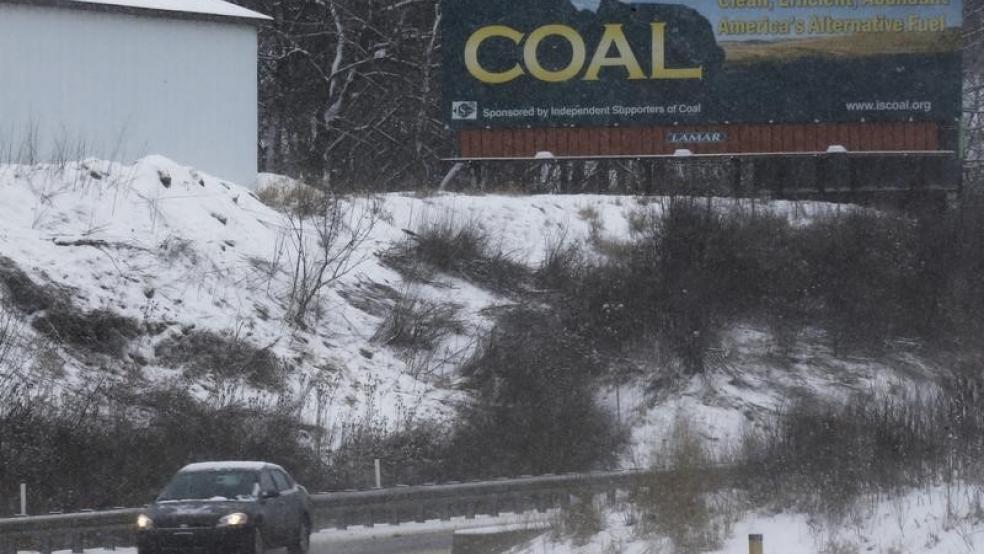President Obama’s battle with King Coal continues. The Interior Department on Friday announced a moratorium on new leases for coal mined on federal lands in the West as part of a major review of the federal government’s management of taxpayer-owned coal fields and natural resources.
Obama has been locked in a bitter struggle with the coal industry and its champions on Capitol Hill -- including Senate Majority Leader Mitch McConnell (R-KY) -- over the administration’s far-ranging efforts to tighten environmental emissions standards for coal-fired power plants and accelerate the nation’s move away from coal to alternative energy sources, including solar power and wind.
Related: ‘King Coal’ McConnell Wants to Scrap Obama’s Carbon Plan
Friday’s order was premised on the administration’s call to reexamine the government’s leasing practices with major coal companies that mine on government lands in Wyoming’s Powder River Basin and other coal-rich regions to determine whether taxpayers are being adequately reimbursed for the use of the land. For years, environmental groups and other government watchdogs have argued that the government should be charging mining companies much higher rates for the right to mine on government lands.
However, the moratorium invariably will be caught up in the larger controversy over Obama’s environmental policies aimed at dramatically reducing the nation’s reliance on coal to generate electricity as a means of reducing greenhouse gas emissions that directly contribute to global warming.
The move is potentially a major economic blow to the coal industry, allowing companies to continue operating under existing leases in the coming decade but freezing negotiations over future leases that could discourage investors from putting more money into the ailing coal industry. Obama signaled the move Tuesday night when he declared during his State of the Union address that “I’m going to push to change the way we manage our oil and coal resources so that they better reflect the cost they impose on taxpayers and our planet.”
Interior Secretary Sally Jewell announced the moratorium, saying that it was time to re-examine the decades-old coal-leasing program, from health and environmental impacts to whether taxpayers were getting a fair return for the hundreds of millions of tons of government-owned coal mined and marketed every year, according to The Washington Post.
Mining companies currently pay a 12.5 percent royalty rate for coal taken from surface mines, compared to an 18.75 percent royalty for oil and gas from offshore drilling, the Post reported. Coal company officials argue that the actual rates paid to the government are much higher because of bonuses and other fees paid through lease agreements.
Related: The Pros and Cons of Obama’s New Carbon Rule
A 2013 study by the Government Accountability Office questioned whether the lease royalty rates – generating about $1 billion annually in government revenues -- accurately reflected the true market value. Taxpayers for Common Sense contends that taxpayers have lost $30 billion on undervalued coal over the past several years, while the government has also incurred liabilities from abandoned mines
“It is abundantly clear that times are different in the energy sector now than they were 30 years ago, and we must undertake a review and that’s what we need to do as responsible stewards of the nation’s assets,” Jewell told reporters in a conference call. “That was a time, 30 years ago, when our nation had very different priorities and needs. The result was a federal coal program designed to get as much coal out of the ground as possible, and in many ways that’s the program that we’ve been operating ever since.”
National Mining Association President and CEO Hal Quinn denounced the moratorium as an economic setback for the coal industry that could result in the loss of more jobs and create another impediment to the production of a low-cost and reliable source of energy production..
“The idea that future coal leasing requires a pause to evaluate environmental impacts defies credulity,” Quinn said. “Every federal coal lease sale and subsequent mining project must pass multiple levels and sequences of both federal and state evaluation. It is stunning that the administration believes a process that already pushes the development of coal projects beyond a decade needs more red tape and delays.”
Related: How Climate Change Costs Could Soar to the Billions
Arch Coal, one of the largest U.S. coal companies, filed for bankruptcy on Monday, making it the second company with large Western mines to seek Chapter 11 restructuring in recent months. Officials of the company, based in St. Louis, said it expects to continue to operate its mines and pay its 4,600 employees while it seeks a bankruptcy court’s approval for its debt restructuring.





